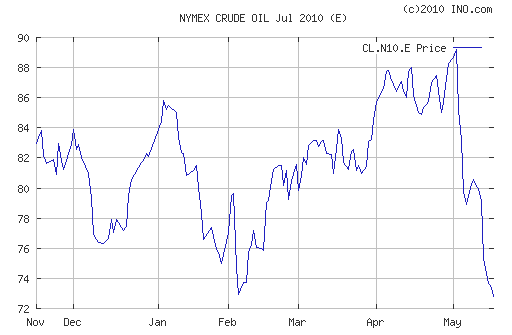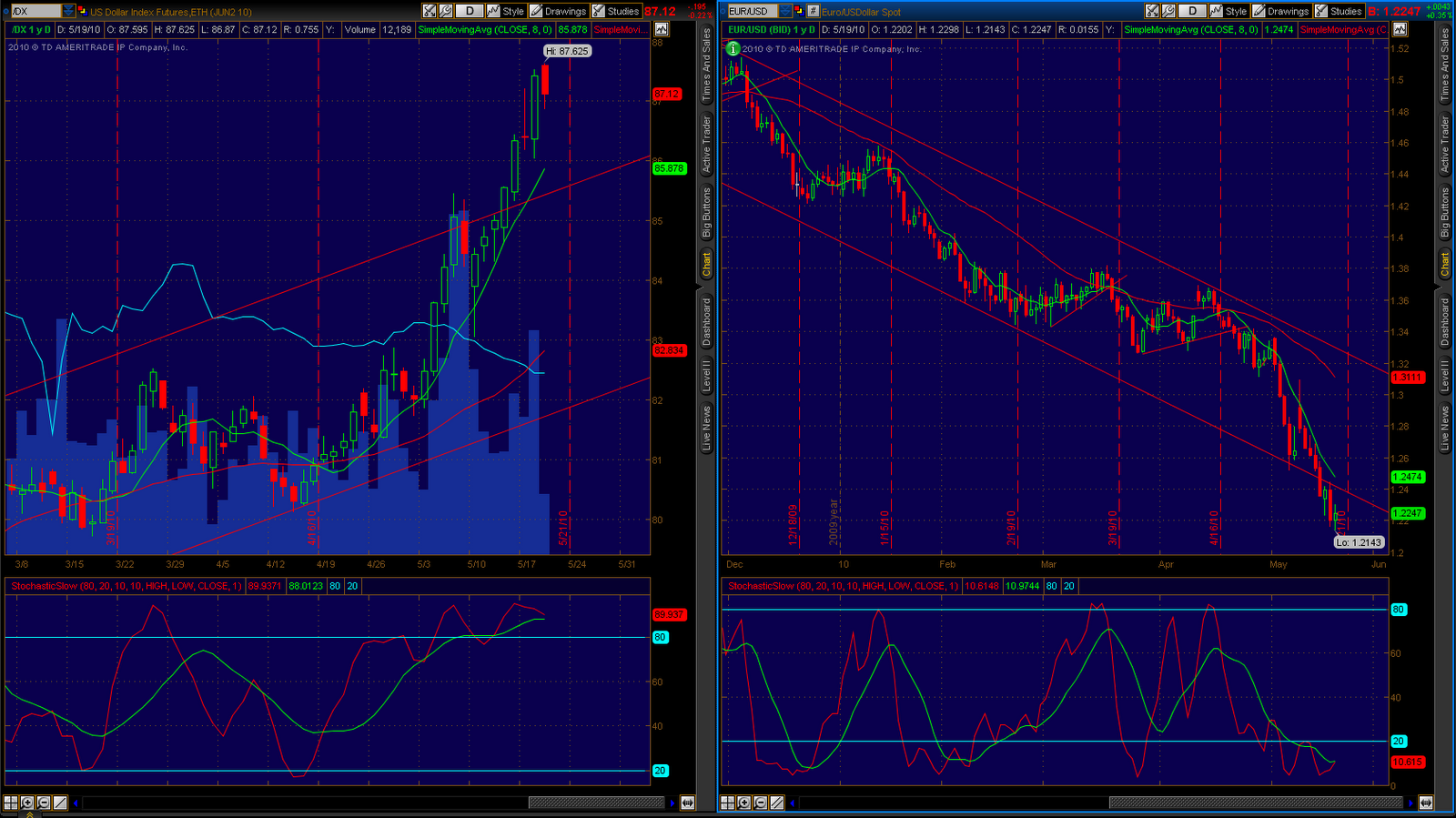Banki pod presją fintechów
Kategoria: Trendy gospodarcze
Jeszcze nie zdążyła wybrzmieć debata na temat pakietu pomocowego Unii dla Grecji, a już zaczyna się dyskusja o nowym pakiecie – tym razem dla banków europejskich. Były dyrektor ds. polityki Bank of England David Blanchflower w telewizji Bloomberg ku zaskoczeniu wszystkich stwierdził, iż przede wszystkim należy ratować banki europejskie. I że taki pakiet niewątpliwie zostanie uchwalony:
„What we really have to think about,” mówił „are rescuing the banks, dealing with this credit crisis, giving confidence back to the euro area, which they’ve not done…And let’s think about how we can organize the next rescue package, which inevitably is going to come”.
Wczoraj, 19 maja, Barron’s straszył odredakcyjnym artykułem, że do końca roku euro będzie kosztować dolara, a może i mniej. Bo jak zauważa jeden z dzisiejszych blogerów, zła polityka Unii powoduje ucieczkę inwestorów od euro. „Im bardziej politycy unijni budują zaufanie do waluty, tym mocniej je podkopują”.
Jako głos poparcia na rzecz stworzenia centralnej władzy fiskalnej włączył się ekonomista z Peterson Institute Jakub Funk Kierkegaard.
Ratingsreform pyta o transparentność agencji ratingowych. Wiążą się z tym dwa problemy: po pierwsze źródło danych wprowadzanych do modeli ratingowych, po drugie transparentność założeń przyjmowanych przy procesie dokonywania ocen.
In one of the more striking recent reports, Moody’s commented in that “the data fields essential for running the model were established when the model was first introduced in 2002. Since then, the mortgage market has evolved considerably, with the introduction of many new products and an expansion of risks associated with them.”
CFzone przedstawia zestawienia badań dotyczących małego biznesu: Firmy, które powstały między 2006 a 2004 r. stworzyły większość miejsc pracy. Według raportu Fundacji Ewing Marion Kaufmann, prowadzącej badania efektywności małych i średnich, to właśnie one co roku zatrudniają co 10 nowego pracownika. Ale mimo że w Kongresie działa komisja zajmująca się ich problemami, to jednak są one traktowane przez rząd najgorzej.
But, for the smallest establishments, the story is startlingly different. They now employ 103.5 percent of the people they employed in December 2000.
Then, there’s a study from the Ewing Marion Kauffman Foundation I wrote about recently. It showed that high-growth companies that are three -to- five years old account for about 10 percent of new jobs in any given year, (…).
But, if small establishments and so-called gazelle firms are so important to job growth, then the latest data from the National Federation of Independent Business, is especially sobering. The findings showed (…) flat growth in capital expenditures.
Daily Reckoning pyta, dlaczego niemiecki rząd zakazał nieosłoniętej short selling? I z przekąsem głośno się zastanawia: w obawie przed spekulantami, którzy podważają zaufanie do ubezpieczeń wartych kredytu, albo do rozsądnej polityki fiskalnej rządów? Raczej jest to znak spadku wartości zasobów banków (obligacji), co może spowodować powtórkę z 2008 r., kiedy instytucje finansowe wyzbywały się części zasobów, by mieć środki na pokrycie strat z innych, spowodowanych złymi kredytami lub zasobami, które straciły wartość.
More seriously, why institute the ban on naked short selling now? And why take the extra step of preventing anyone in the market from going short government bonds? To be charitable, you could assume that the asset price falls (especially in government bonds) are the work of evil speculators (the global wolf pack) who are unfairly damaging and destroying confidence in otherwise credit-worthy securities and sound government fiscal policies (cough).
But more likely, if asset values on bank balance sheets are falling (principally government bonds) then it could again trigger the whole deleveraging vicious cycle we saw in 2008 where institutions are forced to sell some assets to cover losses on other assets or loans. You get a whole lot of selling and much lower prices, which is of course exactly what needs to happen.
Przed niebezpieczeństwem powtórki z 2008 przestrzega też Big Picture. Jego zdaniem dług powoduje tąpnięcia na rynkach. A zatem nie ograniczenie short czy long selling, ale raczej radykalne obcięcie wydatków może ustrzec przed całkowitym się załamaniem handlu.
What all these so-called „solutions” had in common was that they treated the problem of too much underlying debt as a liquidity issue. But illiquidity was a symptom of too much borrowing gone bad, not the debt disease itself. Much like the EU’s rescue plan for southern Europe, or Germany’s ban on certain types of short-selling, most of the politically expedient solutions offered up around the world since 2007 have been targeting the wrong problem. Debt, not illiquidity, is the real problem. And the results are plain to see. Many private sector obligations have been absorbed by public sector entities. We keep trying to solve a debt problem by taking on more debt.
Ale zdaniem niektórych ekonomistów już dziś są obawy, że mamy do czynienia z deflacją. Dan Denning z DR i Econbrowser twierdzą, że spadające ceny ropy, aluminium, miedzi, a nawet złota właśnie o tym świadczą. I oboje nieco szydzą z komentatorów, którzy twierdzą, że jest to korekcja rynku: kredytobiorcy odkrywają, że kredyt nie był taki dobry; biznes, że nie wykonał zaplanowanej sprzedaży; rynki, że ich zasoby nie są tyle warto, co myśleli inwestorzy….
Yes, dear reader…prices are falling. In April, the US producer price index fell 0.1%.
Oil fell to $72 yesterday. The Dow fell 114 points.
Copper is down more than 20% from its high. Chinese stocks are down 21% so far this year.
The CRB – a measure of commodities prices – is down about 12%.
Even gold got whacked yesterday – down $13.
What’s going on?
Well, we’re in that long period of adjustment known (to us!) as the Great Correction.
In the first stage…
.the markets discover that its assets aren’t worth as much as investors had thought….
.creditors find that their credits aren’t as good as they had believed…
.consumers realize that they don’t have as much money to spend as they had hoped…
.businesses find that they don’t have as many sales as they had projected…
.and governments wake up to the fact that tax revenues are coming in at less than expected levels
Moreover, the declines in stock market values and commodity prices since April have only served to reverse the gains in March. So perhaps it’s most accurate to describe developments so far not as a conviction that we’re on the verge of replaying events of 2008, but simply as a realization that the global economic recovery is not as strong as it appeared to be just a month ago.
A zatem może odbicie gospodarki nie jest takie pewne, jak jeszcze wydawało się to miesiąc temu? Po lewej stronie zrzutu z ekranu programu giełdowego widać jak zachowywuje się dolar od sierpnia do maja, a po prawej: euro – od grudnia z prognozą do czerwca.
Jednak nie wszyscy są pesymistami. Mark Thoma z Maximum Utility zachęca rząd do podjęcia właściwej polityki, która jego zdaniem podtrzyma rozwój gospodarczy: podtrzymania pakietów pomocowych. A przede wszystkim zaradzenia problemowi bezrobocia, który nie zniknie natychmiast, gdy gospodarka przyspieszy.
I don’t mean the the government should try to manage the economy with a heavy handed industrial policy approach, but when it’s clear that change is coming to a particular sector, then the government should do what it can to help (or at least get out of the way).

